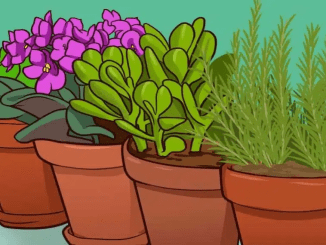
Often dismissed as an annoying weed, plantain (Plantago major and Plantago lanceolata) is actually one of the most powerful medicinal plants available to us.
Found growing in gardens, lawns, and even sidewalk cracks, plantain has been used for centuries in herbal medicine to treat a wide variety of ailments.
Rich in vitamins, minerals, and natural compounds, plantain offers numerous health benefits and can be easily incorporated into your daily wellness routine.
In this article, we’ll explore why this little weed is considered one of the most useful medicines on the planet and how you can use it to support your health.
What is Plantain?
Plantain is a common perennial herb that belongs to the Plantaginaceae family. It is not to be confused with the banana-like fruit of the same name.
There are two main types of plantain: Broadleaf plantain (Plantago major) and Narrowleaf plantain (Plantago lanceolata). Both varieties have distinctive leaves that grow close to the ground and produce small, inconspicuous flowers on tall spikes.
Plantain is often found growing in disturbed areas, like lawns, roadsides, and fields, and is highly resilient, making it accessible to most people.
This plant has been used in traditional medicine for centuries due to its rich profile of beneficial compounds, including vitamins A, C, and K, calcium, and iron, as well as bioactive compounds like flavonoids, tannins, and aucubin.
Health Benefits of Plantain
1. Powerful Anti-Inflammatory Properties
Plantain has strong anti-inflammatory effects, making it useful for treating a variety of conditions involving inflammation.
It can help soothe skin irritations, such as rashes, eczema, and insect bites, as well as reduce internal inflammation, which can benefit conditions like arthritis and digestive issues.
- How It Works: Plantain contains compounds like aucubin and flavonoids that inhibit inflammatory pathways in the body, reducing swelling, redness, and pain.
- Benefit: Applying plantain poultices to the skin or drinking plantain tea can help alleviate inflammation both externally and internally.
2. Natural Wound Healer
Plantain is a remarkable wound healer and has been traditionally used to treat cuts, scrapes, burns, and other minor injuries.
It has antibacterial properties that help prevent infections and promote faster healing by encouraging tissue regeneration.
- How It Works: The allantoin in plantain helps speed up skin repair and promotes the growth of new cells, while its antibacterial properties keep wounds clean.
- Benefit: Use plantain leaves as a poultice directly on wounds to accelerate healing and reduce the risk of infection.
3. Relieves Respiratory Issues
Plantain is a natural expectorant, which means it helps loosen and expel mucus from the respiratory tract.
It is particularly effective in treating coughs, bronchitis, and other respiratory conditions by soothing irritated mucous membranes and reducing congestion.
- How It Works: Plantain’s soothing and anti-inflammatory properties calm the respiratory tract, while its expectorant effect helps clear out phlegm and mucus.
- Benefit: Drinking plantain tea or using a plantain tincture can help relieve symptoms of coughs, colds, and other respiratory issues.
4. Supports Digestive Health
Plantain is known for its ability to support healthy digestion. It helps soothe the digestive tract, relieve constipation, and reduce symptoms of indigestion and heartburn.
Its mucilage content forms a protective layer in the stomach and intestines, reducing irritation and promoting healing.
- How It Works: The mucilage in plantain provides a soothing effect on the digestive tract, while its anti-inflammatory properties reduce gastrointestinal irritation.
- Benefit: Drinking plantain tea or consuming the fresh leaves can help alleviate digestive discomfort and promote gut health.
5. Natural Antimicrobial and Antifungal
Plantain has potent antimicrobial and antifungal properties, making it effective in treating infections and inhibiting the growth of harmful bacteria and fungi.
It can be used both internally and externally to combat a wide range of infections.
- How It Works: The bioactive compounds in plantain, such as aucubin, have been shown to have antibacterial, antiviral, and antifungal effects.
- Benefit: Use plantain in teas, tinctures, or as a poultice to help fight off infections naturally.
6. Eases Skin Conditions
Plantain’s soothing properties make it an excellent remedy for a variety of skin conditions, including acne, eczema, and psoriasis.
It can help reduce redness, itching, and irritation, while its antimicrobial effects prevent bacterial infections.
- How It Works: The anti-inflammatory and antimicrobial properties of plantain help calm irritated skin, reduce swelling, and prevent infections.
- Benefit: Apply plantain-infused oil or fresh plantain leaves directly to the skin to treat conditions like eczema, acne, or insect bites.
7. Supports Detoxification
Plantain has mild diuretic properties that help cleanse the body by promoting the elimination of waste and toxins through urine.
This detoxifying effect can support kidney function and improve overall health.
- How It Works: The diuretic properties of plantain increase urine production, helping the body flush out toxins and reduce water retention.
- Benefit: Drinking plantain tea regularly can help detoxify the body and support kidney health.
How to Use Plantain
1. Plantain Tea
Plantain tea is one of the easiest ways to enjoy the health benefits of this amazing plant.
- How to Make: Add a handful of fresh or dried plantain leaves to a pot of boiling water. Let it steep for 10-15 minutes, strain, and enjoy. You can add honey or lemon for extra flavor.
- Benefits: Drink plantain tea to relieve respiratory issues, support digestion, and boost immunity.
2. Plantain Poultice
A plantain poultice can be used to treat wounds, insect bites, and skin irritations.
- How to Make: Crush fresh plantain leaves into a paste and apply directly to the affected area. Cover with a clean cloth or bandage and leave it on for several hours or overnight.
- Benefits: Use the poultice to speed up wound healing, soothe skin irritations, and reduce inflammation.
3. Plantain Tincture
A plantain tincture is a concentrated extract that can be used to support overall health and well-being.
- How to Make: Fill a jar with chopped fresh plantain leaves and cover with high-proof alcohol (such as vodka). Seal the jar and let it sit for 4-6 weeks, shaking occasionally. Strain the liquid and store it in a dark bottle.
- Benefits: Take a few drops of the tincture daily to boost immunity, reduce inflammation, and support digestive health.
4. Plantain-Infused Oil
Plantain-infused oil can be used topically for skin conditions or as a base for homemade salves.
- How to Make: Fill a jar with fresh plantain leaves and cover with a carrier oil (such as olive or coconut oil). Seal the jar and let it sit in a warm, sunny spot for 2-3 weeks. Strain the oil and store it in a clean, dark bottle.
- Benefits: Apply the infused oil to soothe skin conditions, reduce inflammation, and promote healing.
Plantain is an incredibly versatile and powerful medicinal plant that offers a wide range of health benefits, from healing wounds and soothing skin irritations to supporting digestion and respiratory health.
Often overlooked as a common weed, plantain is truly one of the most useful plants on the planet.
Incorporating plantain into your daily routine is easy, whether you drink it as a tea, use it as a poultice, or make your own tinctures and oils.


